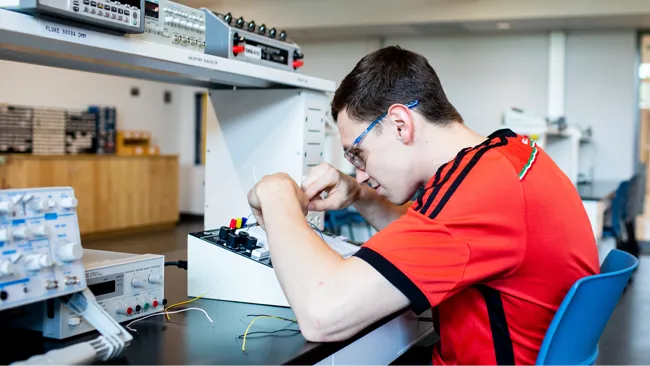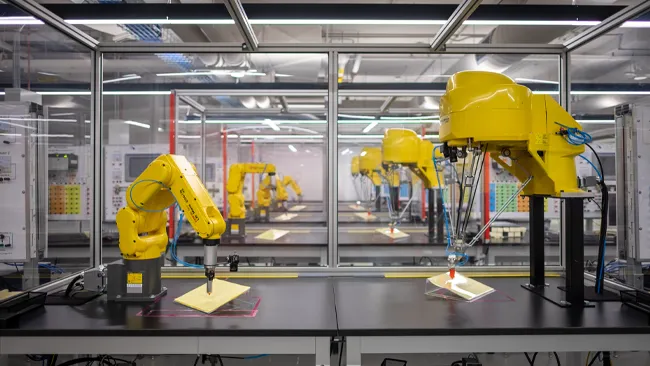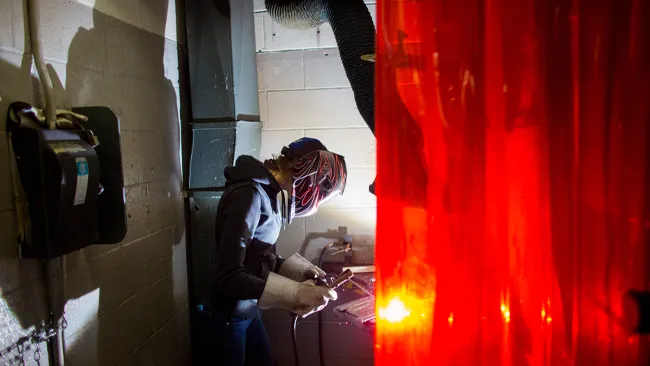
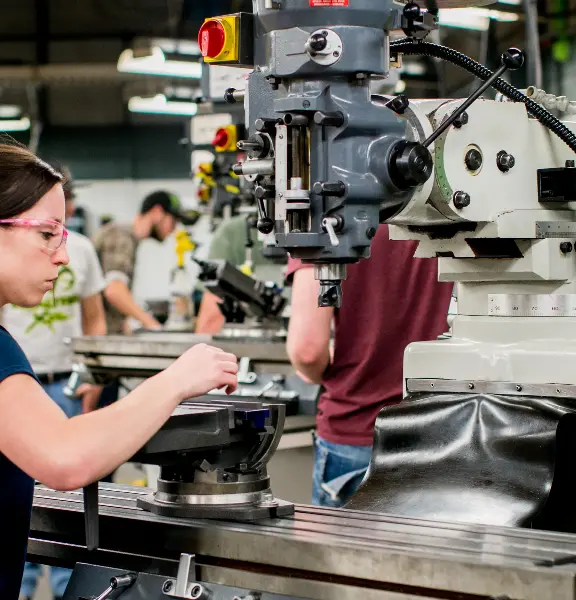
Millwright Mechanical Technician
CIP Code: 47.0303
Overview
Anywhere there's industrial equipment, a Millwright is required to install, repair, maintain, and modify that equipment. Explore the variety of places a Millwright can work - the possibilities are endless.
This program is well suited for those who enjoy working with mechanical applications. Students are provided with the skills necessary to safely install, troubleshoot, overhaul and maintain a variety of mechanical equipment used in industrial operations. The program also integrates best practices commonly used in the industry. Areas of study include: machining, blueprint reading, hydraulics and pneumatics, electronic, power transmission and lubrication, materials science, preventative and predictive maintenance, project management, PLC, Robotics, CNC, and 3D modeling.
The Mechanical Technician – Industrial Maintenance (Millwright Mechanical Technician) program is recognized by the Ministry of Colleges and Universities as a co-op/diploma program. Graduates meet the program standards of an Ontario Mechanical Technician, as well as the in-school training of an Industrial Millwright Apprenticeship.
Students who are in good academic standing during the first two terms of the program will be eligible to apply for a four-month co-op job placement as available. A student is considered to be in good academic standing if they have passed all of their courses and have maintained a GPA of 2.5 or greater. Students seeking co-op job placement positions must apply for them and be chosen following an interview process. The college actively pursues companies to participate in the program but cannot guarantee co-op placements for each student.
Please Note: Equipment and hand tools are available onsite for use during the duration of the program.
Why Colin Chose Lambton
Admission Requirements
O.S.S.D. or equivalent with:
- Grade 12 English C or U
- Grade 12 Mathematics C or U
- Grade 11 or 12 Physics C or U (recommended)
Grade 12 Mathematics Requirement
Grade 12 Mathematics for College Technology or any grade 12U mathematics is recommended; Grade 12 Foundations for College Mathematics (MAP4C) minimum final grade is 60%. If the program is highly competitive, students with Grade 12 Mathematics for College Technology or any Grade 12U mathematics will be given preference.
The admissions process is competitive and meeting the minimum academic requirements does not guarantee admission.
Lambton College reserves the right to alter information including admission requirements and to cancel a program or course at any time; to change the program curriculum as necessary to meet current competencies or changes in the job market; to change the pathways to third-party certification bodies; or to withdraw an offer of admission both prior to and after its acceptance by an applicant or student because of insufficient applications or registrations or over-acceptance of offers of admission. In the event Lambton College exercises such a right, Lambton College's sole liability will be the return of monies paid by the applicant or student to Lambton College.English Language Requirements
International applicants must demonstrate their knowledge and skills in English by submitting an English proficiency test. Please refer to our English Language Requirements webpage to determine which minimum scores are accepted.
Meeting the minimum English requirements does not guarantee admission. Students with higher English proficiency scores will receive priority in the admission assessment process. Not all students will qualify for EAP-3106 in place of the required IELTS or TOEFL test scores.
Costs
- Term 1 $8,003.48
- Term 2 $7,213.45
- Co-op Term $0.00
- Term 4 $7,913.45
- Term 5 $7,213.45
Total Cost of Program
Tuition fees are estimates and are subject to change each academic year. Fees do not include books (unless specifically noted), supplies or living costs.
Lambton College reserves the right to alter information including admission requirements and to cancel at any time a program or course; to change the location and/or term in which a program or course is offered; to change the program curriculum as necessary to meet current competencies or changes in the job market; to change the pathways third-party certification bodies; or to withdraw an offer of admission both prior to and after its acceptance by an applicant or student because of insufficient applications or registrations or over-acceptance of offers of admission. In the event Lambton College exercises such a right, Lambton College’s sole liability will be the return of monies paid by the applicant or student to Lambton College.
Additional Fees
-
Calculator$24.00
-
Safety Shoes$150.00
-
Safety Glasses$20.00
Welding Clothing
Students will be expected to purchase the following from Acklands-Grainger:
- Welding Gloves
- Helmet
- Jacket
These items are purchased in-class and cost will be determined at the time of purchase.
Important Dates, Deadline & Late Fees
For additional information on registration dates, deadlines and late fees please refer to Registration Dates and Deadlines.
Student Fees
A student services fee is included in your tuition.
Health Insurance Coverage
Emergency medical insurance is mandatory for all international students at Lambton College. This includes students who are full-time and part-time and who are on a co-op. This insurance is provided by GuardMe - a third party insurance provider.
Technology Requirements
In order to keep pace with the requirements of each and every course in your program, Lambton College requires that each student have access to a laptop while studying at our college.
Labs & Equipment
Courses
Maintenance Tools & Techniques
This course will cover the fundamentals of Machine Shop, hand and power equipment, measuring tools, materials, and practices. The students will learn to function safely in the work environment, select and use references, tools, methods, and procedures, to create and alter mechanical components to given specifications. Theory will include safety, precision measurement, hand tools, power hand tools, machine tools and cutters.
Basic Engineering Drawings
Millwrights and technicians require the ability to sketch, read, and interpret engineering drawings and schematics. These skills are necessary in order to comply with drawing standards and specifications while installing and maintaining machinery. Topics in this course include orthographic projection, multi-view projection, dimensioning, the title block and drawing notes. A variety of view types will be examined including auxiliary, assembly, detail, isometric and section. As well, an introduction to welding symbols and geometric tolerances will be covered.
Rigging & Hoisting
This course is designed to develop knowledge of the safety legislation involved with hoisting, lifting and machine moving as well as the procedures involved. This course will enable the student to plan lifts, perform calculations using load charts, select and use correct rigging & hoisting equipment, inspect and maintain equipment, use hand signals, control load balance and direct and disassemble all equipment safely.
Workplace Communications
In this course, students write and speak in response to realistic workplace scenarios to build practical communication skills. They produce, revise, and edit written communication geared to the workplace and practice the oral communication and effective listening skills that will help them succeed in professional environments.
Job Search & Success
This course provides student with skills and knowledge to help support their career search and succeed in the workplace. Students align their personal skill set and goals to guide them on their career paths. They will learn how to effectively conduct a job search, build a professional and well-tailored resume and cover letter, and develop and practice interview techniques. Students will also develop their personal brand to help support effective career networking and aid in their job search. Teamwork and collaboration in the workplace are also discussed. Self-reflection is used to inspire insight and support their professional career journey.
Mechanical Mathematics I
This is the first of two courses on technical mathematics, designed specifically for the Mechanical Technician Industrial Maintenance program. It reviews and develops topics in computation, measurement, algebra, and geometry, emphasizing technical applications.
Safety & Welding Basics
This course is designed to develop knowledge of general safety practices and operating principles of OFC/OFW (oxy-fuel cutting/welding), brazing, PAC (Plasma Arc Cutting), and semi-automatic welding equipment (Gas Metal Arc Welding-GMAW, Flux Cored Arc Welding-FCAW, Metal Cored Arc Welding-MCAW). Emphasis will be given to cutting and welding in the flat and horizontal positions. All industrial operations entail potential risks to health and safety, especially when welding. The intent of this course is to minimize these hazards by providing the student with the skills to comply with all safety rules and procedures involved in the industry.
Introduction to Pumps, Machines & Piping
This course is a survey of the aspects of pumps, piping and conveyor systems applicable to Mechanical Technicians in the Industrial Maintenance program. Millwrights working in the trade will be involved with many different types of equipment including pumps, piping systems and conveyors. The millwright must be familiar with the different types of pumps, their unique features and how they are maintained. Piping systems are associated all other plant equipment. This piping must be selected, installed and maintained. The student will develop knowledge regarding types, selection and the principles of operation of various materials handling systems. The knowledge obtained is considered as background for other technical courses including Preventive and Predictive Maintenance.
Maintenance Machine Shop
This course will focus on the advanced techniques of machine tool operations. The students will learn to set-up and repair machine and equipment components, select and use appropriate materials, references, tools, methods, and procedures. Theory will include references for shafts, couplers, drivers, metals and heat treatment of metals. For mechanical equipment to have a long life it must be assembled while maintaining alignment and clearances to close tolerances. The practices in this course refine the skills and disciplines that the machinist uses to establish and maintain alignments, fits and clearances.
Advanced Engineering Drawings
Millwrights and technicians require the ability to sketch, read, develop and interpret engineering drawings. These skills are necessary in order to comply with drawing standards and specifications while installing and maintaining machinery. Topics in this course include developing Engineering Drawings using AutoCAD (2D) and Solidworks (3D). Computer Aided Design (CAD) Software is used for the creation and modification of parts, assemblies and drawings. The construction and constraining of assemblies will be covered as will the creation of part and assembly drawings using the software.
Power Transmission, Bearings & Lubrication
This course is designed to prepare the student to disassemble, service and recommission the components in power transmission applications. These applications include belts and pulleys, chains and sprockets, shafts, speed reducers, gears, brakes, clutch mechanisms, harmonic drives, couplings, cams and followers, keys, splines, bushings, bearings and seals. Students will be introduced to the types, properties and application of lubricants. Students will perform associated trade calculations and interpret engineering and component drawings, ISO charts, and bearing catalogues to ensure that work performed conforms to specifications. Millwright technicians are required to perform various tasks related to removal, maintenance and the installation of power transmitting components. They must follow safety guidelines, manufacturers? specifications and company procedures. They must understand the workings of assembly components and be able to communicate effectively with manufacturers, engineers and skilled trades workers.
Mechanical Mathematics II
This course continues MTH 1253. It covers trigonometry ratios and graphs, vectors, exponential and logarithmic functions, and probability and statistics.
Advanced Welding & Fabrications
This course is a continuation of WEL-1123. It is intended to develop additional knowledge and skills in welding practice, techniques and the pertinent regulations. An understanding of welding symbols, as portrayed on drawings, layout and set-up, metal preparation, electrode selection, Gas Tungsten Arc Welding (GTAW), Shielded Metal Arc Welding (SMAW) and Carbon Arc Cutting with Air (Gouging, CAC-A) techniques will be developed. The student will develop the knowledge and capability to read drawings and safely layout, measure, cut, tack, fabricate, weld and assemble metal and other components to specifications. Various shop projects with industrial and construction applications will be planned and assembled using the appropriate tools and equipment. Welding practices and procedures are essential skills.
Schematics & Cataloguing
Millwrights are required to interpret engineering drawings and how components exist separately and how they interact with one another. This knowledge is then used to disassemble machinery, order replacement parts, rebuild and maintain. This course introduces students on how to effectively use manufacturer's catalogues, technical manuals and engineering drawings to select components according to specifications and functional needs.
Co-op Work Term (optional)
Co-operative education provides students with the opportunity to apply classroom learning to the workplace, undertake career sampling and gain valuable work experience that may assist students in leveraging employment after graduation.
Pneumatics & Hydraulics
This course develops an understanding of the basic principles and applications of pneumatics and compressed air safety as it relates to pneumatic systems. Basic hydraulic principles and the ability to perform pertinent hydraulic calculations, install, maintain and troubleshoot components will also be covered. Valves are used extensively in pneumatics, hydraulics and throughout all sections of industry. Knowledge of valve types, purposes and correct selection for specific systems will be covered. The operation, function and maintenance of ventilation, dust collection and cooling towers will also be included.
Basic Science & Mechanical Theory
This course provides an introduction to the principles of physical science as it pertains to the Millwright trade. Subjects include thermodynamics, applied mechanics, strength of materials, and waves. Students are required to use problem solving skills to complete analytical exercises and to produce written lab reports.
Electrical Fundamentals
This course introduces electrical principles that are fundamental to the operation and control of industrial equipment. Topics include: safe practices, electrical terminology, symbols, AC and DC circuit analysis principles, introduction to transducers, transformers and how DC and AC electric motors operate and are controlled. A laboratory component runs concurrently with the lectures. Lecture and laboratory are designed and scheduled to supplement and reinforce the learning outcomes of the course.
Advanced Compressors & Pumps
This course is a comprehensive study of rotating and reciprocating industrial equipment including pumps, compressors and turbines. Affiliated equipment used to safely operate the above listed is also included in this study. Mechanical Maintenance Technicians require the ability to perform a wide variety of tasks to high standards, as specified in maintenance procedures, in a safe and cost effective manner. Understanding the design features, operation and maintenance requirements of this equipment will enhance troubleshooting skills to perform inspection and repair as needed. Knowing the workings of this machinery will enable the student to communicate effectively regarding specific repairs and adjustments.
General Education Elective (Select 2)
Industrial Materials & Metallurgy
This course is designed to provide the student with an enhanced understanding of industrial materials of construction and metallurgy. Materials studied will include ferrous and non-ferrous metals as well as non-metallic materials. Properties, selection and applications of various materials, corrosion awareness, failure analysis and application of simple NDE will be examined. Why materials are selected for certain applications and how they are affected by their manufacturing methods and their environment will be studied. The properties and aspects of materials have direct bearing on the application for a specific use. Metallic and non- metallic materials have evolved and the wide range of materials available today can be staggering. Corrosion and material failures occur and a good understanding of these topics as well as non-destructive examination is required of maintenance personnel to provide continued safe plant operations.
Preventive & Predictive Maintenance
This course introduces students to the procedures, equipment, benefits and differences between the various types of maintenance programs. Students will be exposed to topics including vibration monitoring and analysis, dynamic balancing, non-destructive examination, lubrication and oil analysis. Students will learn how to maintain and utilize historical data, develop analytical and basic troubleshooting skills, analyze problems, and formulate the corrective sequence of actions. Laboratory exercises provide students the opportunity to actively engage with a variety of equipment and activities associated with a PPM program.
Industrial Automation
With the arrival of industry 4.0, automated systems have become more powerful than ever before. Robotic and PLC systems are now commonly placed in most of today's industries. This integrated lecture/laboratory course will introduce learners to the fundamentals of automated systems. Students will be required to write PLC programs in ladder logic that will perform tasks and control equipment. Students will also learn how to program and operate robots in a safe manner by studying the various safety systems that are a major component of automated robotic cells.
Shutdown Lean Manufacturing
This course provides students with a practical understanding of a Lean Production System. They develop continuous improvement skills, while actively identifying and eliminating all types of waste. Opportunities to improve processes and systems based on work analysis are provided. Topics including 5S, TPM and Visual Controls are also focused on.
Turbines & Prime Movers
This course is a comprehensive study of turbines, internal combustion engines and electric motors. Types, applications and maintenance procedures of prime movers will be examined. Mechanical Maintenance Technicians require the ability to perform a wide variety of tasks to high standards. They are required to complete these tasks as specified in maintenance procedures, in a safe and cost effective manner. Understanding the design features, operation and maintenance requirements of this equipment will enhance troubleshooting skills to perform inspection and repair as needed. Knowing the workings of this machinery will enable the student to communicate effectively regarding specific repairs and adjustments
General Education Elective
Contact
Centre for Global Engagement
LAMBTON COLLEGE SARNIA
1457 London Road
Sarnia ON N7S 6K4
After Graduation
Employment Opportunities
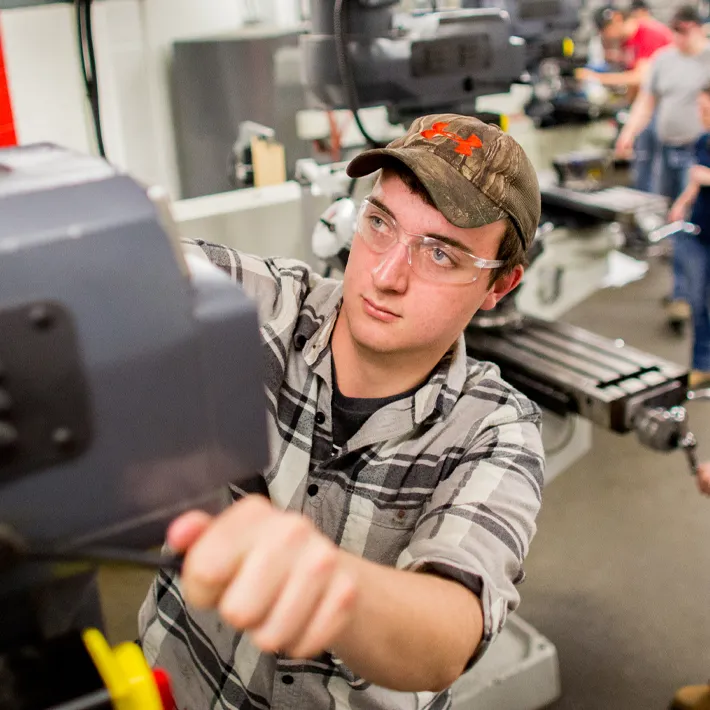
As one of the largest trades and a vital component in most organizations, millwrights have a wide range of potential employment opportunities. Graduates of this program have found careers in industries such as, but not limited to, refineries, nuclear power, manufacturing, and energy, automotive and food processing sectors.
Accreditations & Certifications
Millwright Apprenticeship
Graduates employed in Ontario are exempt from having to take the three levels of in-school Millwright Apprentice training and from having to take the exemption tests. Graduates have the choice of seeking employment as a mechanical technician or a millwright apprentice. Those choosing to become Ontario registered millwrights are required to complete their on-the-job millwright apprentice competencies as well to pass a Certificate of Qualification (C of Q) examination.
Pathways
Build on your education and complete a college diploma or university degree in Ontario, Canada, or abroad
Want to see more Ontario transfers? Visit ONTransfer.ca.
Looking for Support After Graduation?
The International Graduate Services & Support Centre (GSSC) is a place dedicated to assisting International alumni as they seek employment and settle into Canadian life following graduation.
Post-Graduate Employment
International students who successfully complete their programs of study at Lambton College may be eligible to apply for a Post-Graduation Work Permit (PGWP) Program. This program allows students to gain valuable Canadian work experience.
A work permit under the PGWP may be issued for the length of the study program, up to a maximum of three years. A post-graduation work permit cannot be valid for longer than the student's study program, and the study program must be a minimum of eight months in length. The length and approval of the PGWP is determined solely by Immigration, Refugees and Citizenship Canada (IRCC).
Students must meet the eligibility requirements to apply for a post-graduation work permit.
Immigration Regulations & Changes
Immigration regulations are legislated by the Federal Government of Canada and are subject to change at any time without notice. Students are responsible for ensuring that they are in compliance with all Immigration, Refugees and Citizenship Canada regulations at all times during their studies and while in Canada. Lambton College staff are not authorized to provide advice or guidance on immigration-related matters. Prospective applicants and current students should consult the Immigration, Refugees and Citizenship Canada website or call the IRCC Call Centre at 1-888-242-2100 to answer or clarify any immigration-related questions or information.
Co-op
About Co-op
Students in this program have the opportunity to gain valuable work experience by applying classroom learning during co-op experiences.
Learn more about co-op terms and the roles and responsibilities of students and co-op advisors.
Program Capabilities
Program Capabilities outline what skills students should possess as they progress through each term/year of their program.
Students and employers will find this information most useful and can reference either the list of skills or the full program capabilities document to ensure students are gaining the experience they need to fulfill the program requirements.
More Information
Empowering Women to Lead in Tech & Trades
Our Women in Technology & Trades (WiTT) is a vibrant community dedicated to empowering women to thrive in tech and trades. Through mentorship, industry connections, and skill-building programs, WiTT breaks down barriers and fosters an inclusive environment where women can confidently pursue their passions and careers.
Together, we’re shaping a diverse and dynamic future.
Learn more about WiTT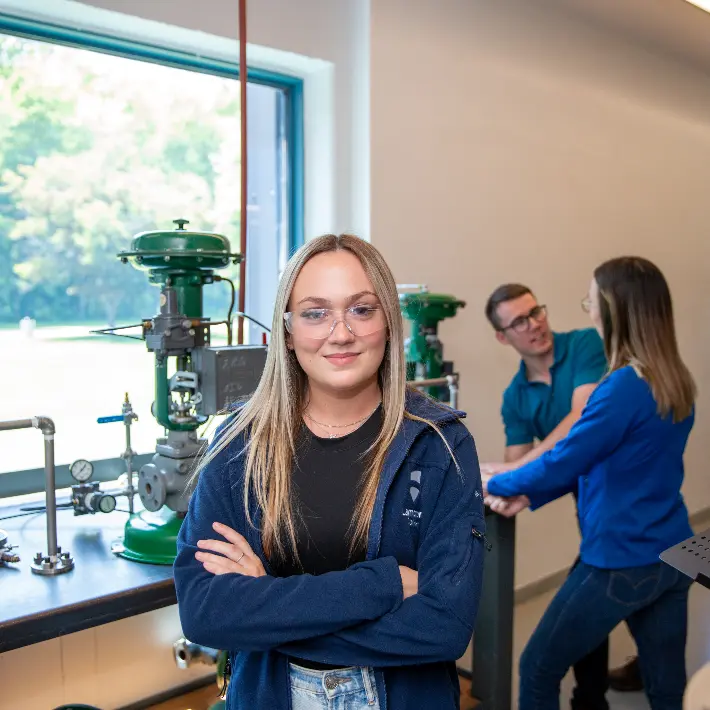
Student Responsibilities
- Course and program delivery schedules are proposed and subject to change for each intake.
- Students are required to bring their own laptop with wireless capability.
- Students are advised to bring an official copy of their most recent police clearance, driver's license, and vaccination record from their home country.

Technology Requirements
It is recommended that you use a Windows laptop for your coursework. While other devices like MacBooks or Chromebooks might work for some tasks, they may not support all the software required for your program. If you're unsure, check with your professors before buying.
Internet Speed Requirements
To get the best experience while learning online, we recommend having an internet connection with at least 40 Mbps download speed and 10 Mbps upload speed. This will help you use video calls, attend online lectures, and access other learning tools smoothly.
Because students live in many different areas, we can't suggest a specific internet provider. You'll need to check with local companies to find one that works best for you.
Laptop Requirements
In order to access the internet and virtually-delivered software and courseware, student laptops should include the following at a minimum. By meeting the following specifications, students will be equipped to access software and courseware on their laptop through the internet:
- Intel i5 8th Gen Processor or equivalent
- 8GB of RAM
- 100 GB HDD or more
- Webcam with a microphone
- Wi-Fi capable (802.11n/ac 5GHz)
- Windows 11 operating system
Mobile Device
Students will require a mobile device (smartphone) for:
- Accessing your digital student ID
- Using campus applications and services
Software
To ensure students are getting the most our of their classroom experience, some software will be required.
Lambton College has made this software easily accessible online. Students can leverage our Microsoft Office 365 software packages and services. In addition, much of the software you require for your courses will be available on demand for use on any device - on or off campus.
